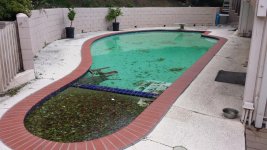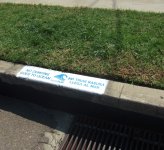- Jul 17, 2019
- 4,077
- Pool Size
- 13000
- Surface
- Plaster
- Chlorine
- Salt Water Generator
- SWG Type
- Pentair Intellichlor IC-40
With Hurricane Hilary having SoCal in its sights, and 4 potential storms in the Atlantic/Gulf of Mexico, I wanted to resurrect these tips from Allen for those in the path. The full thread is below and hope everyone stays safe!
Precautions and Procedures During Heavy Floods
When the rain is coming down multiple inches by the hour, an overflow drain may not maintain the pool water level. For some people that could mean pool water overflowing into the the house.
Appropriate Water Level in the Pool
Things to Consider
Hose bib/spigot to drain water from the pool
Open up the spigot between the filter and main pump. If that's an unwise place to drain, see below. Respect your neighbors and drain away from their property. If you need to drain faster to keep up with rain fall, attach hoses to each spigot from other pumps you may have.
Important***** pump must be on: with my equipment, we kept the pump on high to get the greatest flow out of the hose. When the pump was on low, it was very low flow out of the hose. Use the speed that gives you a margin of safety from the pool overflowing.
Where to drain
You can attach your garden hose to the spigot and drain to a better place - driveway, street, etc. In the Hurricane Harvey situations, we could not have used our deck drains to put the hose end (the deck drains that run to the street). Our street was a rushing river, so my logic (correct or not) said that water with no place to go would all back up in the deck drains. Then the rainfall on the deck couldn't drain. I could very likely be wrong about that. We ran the hoses to our long driveway which has a decent slope and no chance of pooling near the house. We didn't help the rushing street river.....
SWG System
Turn off the salt system. There’s no point using up your cell as your pool water drains down the street. Some systems may allow you to turn it off; others you simply turn the % level down to zero.
Liquid Chlorine Pool
Don't forget if you have a SWG system turned off, you now need to watch the FC level. As others have said, take it up to SLAM level or at least high enough to give you wiggle room for timing of testing (using the band breaks from the storm to get out there and test or simply add more liquid chlorine)
Skimmers
If you're dealing with storms that have bands as with hurricanes or tropical storms, use the break periods from the rain to get the debris out of the skimmers and keep the pool water circulating.
Alternate Methods to Drain a Pool
DE or Sand filters with MPV that drain to waste
Sump pump
If you have one available and have power, throw that into the pool
The old siphon method
 www.troublefreepool.com
www.troublefreepool.com
Precautions and Procedures During Heavy Floods
When the rain is coming down multiple inches by the hour, an overflow drain may not maintain the pool water level. For some people that could mean pool water overflowing into the the house.
Appropriate Water Level in the Pool
- Normal circumstances: halfway up the skimmer, give or take an inch or so.
- Torrential rains: WITH an overflow drain, keep watch on the rate of rainfall and water level rise. Often the overflow drain will keep up. If the water is lapping under the coping and is not holding, get busy preparing for another way to drain water from the pool.
- WITHOUT an overflow drain, don’t wait until the water level is lapping the coping.
Things to Consider
Hose bib/spigot to drain water from the pool
Open up the spigot between the filter and main pump. If that's an unwise place to drain, see below. Respect your neighbors and drain away from their property. If you need to drain faster to keep up with rain fall, attach hoses to each spigot from other pumps you may have.
Important***** pump must be on: with my equipment, we kept the pump on high to get the greatest flow out of the hose. When the pump was on low, it was very low flow out of the hose. Use the speed that gives you a margin of safety from the pool overflowing.
Where to drain
You can attach your garden hose to the spigot and drain to a better place - driveway, street, etc. In the Hurricane Harvey situations, we could not have used our deck drains to put the hose end (the deck drains that run to the street). Our street was a rushing river, so my logic (correct or not) said that water with no place to go would all back up in the deck drains. Then the rainfall on the deck couldn't drain. I could very likely be wrong about that. We ran the hoses to our long driveway which has a decent slope and no chance of pooling near the house. We didn't help the rushing street river.....
SWG System
Turn off the salt system. There’s no point using up your cell as your pool water drains down the street. Some systems may allow you to turn it off; others you simply turn the % level down to zero.
Liquid Chlorine Pool
Don't forget if you have a SWG system turned off, you now need to watch the FC level. As others have said, take it up to SLAM level or at least high enough to give you wiggle room for timing of testing (using the band breaks from the storm to get out there and test or simply add more liquid chlorine)
Skimmers
If you're dealing with storms that have bands as with hurricanes or tropical storms, use the break periods from the rain to get the debris out of the skimmers and keep the pool water circulating.
Alternate Methods to Drain a Pool
DE or Sand filters with MPV that drain to waste
- Turn off the pump
- Turn MPV to WASTE
- Turn the pump on
- Monitor the pump and turn the pump off immediately if the water drops below the skimmers and the pump runs dry. Depending if you have an operational main drain your pump may continue to drain below the skimmer level
- When water is at the desired level turn the pump off
- Turn the MPV back to FILTER
Sump pump
If you have one available and have power, throw that into the pool
The old siphon method
- "You know, like you used to use when you stole gas from your neighbor's car"...
- Fill a garden hose with water and then put one end of a garden hose in the pool and the other end down hill somewhere.
Hurricane Prep
So, it's that time of year. If expecting the possibility of tons of rain and loss of power (for days, hopefully not weeks..) what should I do to prep the pool? Just get the chlorine really high and cross my fingers?
Last edited:



